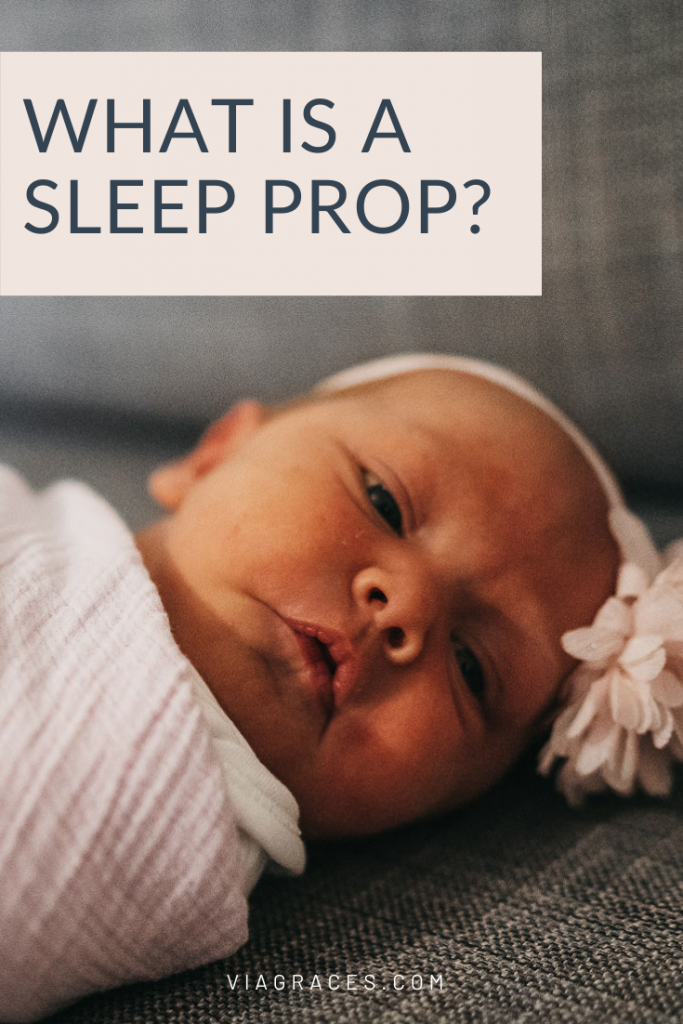Imagine falling asleep in the softest, coziest, warmest environment you can imagine, and then waking up a few hours later on a cold, hard floor, without any pillows or blankets. You would probably wake up confused, angry, and maybe even scared, as you have no idea what happened, and you don’t like it.
This is the same kind of experience babies and kids have when dependent on sleep props. They go to sleep while being rocked in their parents’ arms, or while feeding, or while cuddled up in their parents’ bed, and then they wake up to find their parents are gone, there’s no longer motion, and no more milk. WAAAAAAAAHHHHHHH!

So what is a sleep prop?
A sleep prop is anything outside of a child that he or she needs to fall asleep, which is most commonly nursing/bottle feeding, rocking, patting, singing, bouncing, pacifiers, and a parent (sitting in the room, laying with the child, or co-sleeping).
Why is this important?
When I became a parent, I did not know that all of us (adults and kids!) wake up multiple times throughout the night as we drift in and out of sleep cycles; we just don’t remember because it is quick and we know how to fall back asleep!
For babies and kids who depend on one of the above props, however, as they drift out of one sleep cycle, they often wake more fully because they’ve woken in a different setting or position than they fell asleep in, and they don’t know how to fall asleep on their own. So they cry out and we go in to nurse them, rock them, bounce them, or maybe even pull them into bed with us, because it seems like there’s no other way, and in those early hours, all we want is sleep.
I’ve been there!!
Although most props start off with the best of intentions and sweet bonding times (I mean, who doesn’t love rocking a baby to sleep?), they quickly turn into desperate measures that keep morphing into other desperate measures that consume hours of our time.
Our Story
With our first child, I knew nursing her to sleep would prevent those independent sleep skills from forming, and did a pretty good job sticking to the “eat, play, sleep” pattern during the day, but in the off moments that she fell asleep nursing, I loved it! And for those night wakings, I always nursed her back to sleep.
And although we knew rocking her to sleep would not help us reach our sleep goals, it was the best feeling in the world to have our sweet babe sound asleep in our arms.
However, as the months went on, sometimes nursing Olivia to sleep was the only way she would actually fall asleep. Or what was once sweet rocking then became rocking and singing for what felt like forever, and trading off rocking (or yoga ball bouncing) with Jason every 30 minutes until she was asleep, and then waiting another 10 minutes just to make sure she was asleep.
And can you guess what happened next? We’d hold our breath to see if she’d actually stay asleep once we put her down, otherwise we’d have to start all over. And if it was a successful transfer, it was just a matter of time before she was awake again, needing our assistance to sleep.
Rather than the best feeling in the world, we were now exhausted and frustrated and dreaded bedtime.
Conclusion
Sound familiar?? This is a cycle far too many families find themselves in, sometimes for years, and it’s hard to break those sleep props without a set plan!
Please don’t hear me saying that it’s bad to rock your baby to sleep, or nurse your baby to sleep. If you are in that pattern and you love it and/or it works for your family, that’s okay!
We certainly had seasons when it worked for us, and it was sweet, and then we had a long season when it didn’t work for us and we needed a change.
As a sleep consultant, my goal is to enter into those seasons with you when you want help or need a change, and equip parents to teach their little one how to fall asleep and stay asleep independently, meaning she goes into her crib/bed awake, falls asleep independently, and stays asleep the whole night without parents’ assistance (unless she’s under 6 months old and still needs a feed or two, which is okay!!).
Doesn’t this sound like a dream? When I work with families, we start by pinpointing those sleep props and we make a plan to get children sleeping independently. And then we celebrate! And sleep.
With Grace,
Lauren
